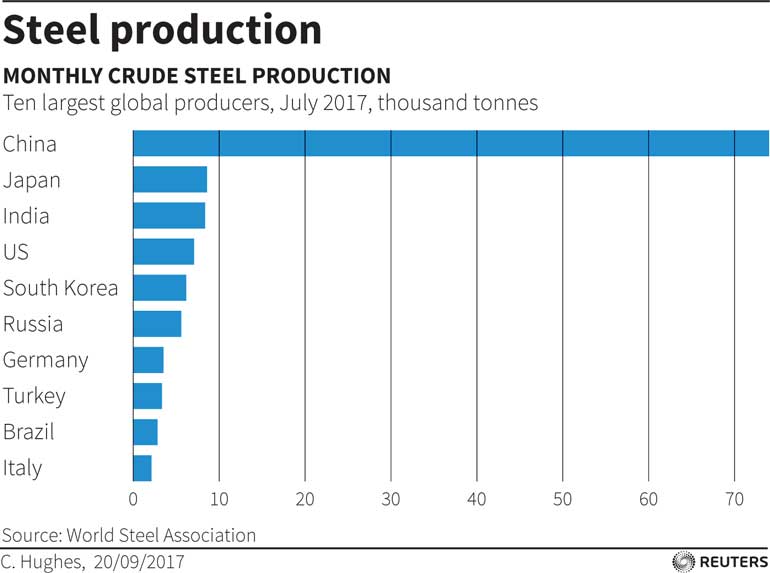Friday Feb 27, 2026
Friday Feb 27, 2026
Monday, 25 September 2017 00:00 - - {{hitsCtrl.values.hits}}

ESSEN, Germany/MUMBAI (Reuters) - Germany’s Thyssenkrupp and India’s Tata Steel agreed last week to merge their European steel operations, creating the continent’s No.2 steelmaker with revenues of 15 billion euros ($18 bln).
The deal, which is preliminary, will help the companies address overcapacity in Europe’s steel market, which faces cheap imports, subdued construction demand and inefficient legacy plants. The merger will also result in up to 4,000 job cuts, or about 8 percent of the joint workforce.
The transaction will not involve any cash, Tata Steel said, adding both groups would contribute debt and liabilities to achieve an equal shareholding and remain long-term investors.
“We want to avoid our steel team restructuring itself to death,” Thyssenkrupp CEO Heinrich Hiesinger told reporters.
“No one is able to solve the structural issues in Europe alone. We all suffer from overcapacity and that means that everyone is making the same restructuring efforts,” Hiesinger told broadcaster n-tv.
European steel prices are about 35 percent below their pre-financial crisis peak.
Wednesday’s long-awaited memorandum of understanding (MoU) between the two steelmakers outlines annual synergies of 400 million-600 million euros, though one top 25 investor in Thyssenkrupp expected synergies to be higher.
“The two companies are being very conservative in their estimates,” the investor said.
The new joint venture, Thyssenkrupp Tata Steel, will be based in Amsterdam, with core profits estimated at 1.5 billion euros in the first year.
“Excellent news,” tweeted Dutch Prime Minister Mark Rutte.
It will be Europe’s biggest steelmaker after ArcelorMittal , with combined production capacity of 27 million tonnes, giving it 25 percent market share in Europe, versus ArcelorMittal’s 38 percent share.
Tata Steel Europe had been a strain on its parent for a decade, burning through approximately $1 billion of cash a year.
The Indian parent will transfer 2.5 billion euros of debt to the new company and is counting on dividend income from the joint venture to help service its remaining debt, Koushik Chatterjee, a group executive director, told Reuters.
That will free up cashflow to allow Tata Steel to focus on meeting growing demand in India, where Chairman N. Chandrasekaran said it will aim to double its manufacturing capacity in five years through plant expansions and acquisitions.
Thyssenkrupp, whose operations span car parts, elevators, construction steel and submarines, is minority-owned by activist shareholder Cevian and has faced calls to split off other parts of the business, most notably its elevator unit.
Cevian declined to comment on the merger, but a source familiar with the matter said it was broadly supportive of Hiesinger’s plan, though it will come down to the nitty gritty of the agreement whether they support it in the end.
The British government and unions said they welcomed the merger so long as commitments made by Tata Steel UK to safeguard jobs and extend blast furnace operations at Britain’s largest steelworks in Port Talbot, Wales, were maintained.
Roy Rickhuss, chair of the steel coordinating committee representing UK unions Unite, GMB and Community, said the unions recognised the industrial logic of the deal, but would still press Tata to confirm it will invest in the Port Talbot steelworks, a vital regional employer.
Earlier this year, Tata made commitments to safeguard jobs and investments in Port Talbot for five years, in return for the unions agreeing to close their final salary pension scheme to future accrual.
Hans Fischer, Tata Europe’s CEO, said the company was not planning to cut capacity, but to instead focus on higher value products, though he declined to give guarantees about jobs or production at Port Talbot post the five year deal.
Thyssenkrupp in its statement flagged potential additional synergy savings beyond 2020 from upstream steel capacity adjustments and Jefferies Rosenfeld said he believes these “are most likely at Port Talbot”.
“We see opportunities to increase or to at least keep the volumes we have today, because there’s a huge market for high quality steel,” said Fischer.
The MoU will be followed by negotiations about the details of the merger as well as due diligence before a contract can be signed at the beginning of 2018, Thyssenkrupp said.